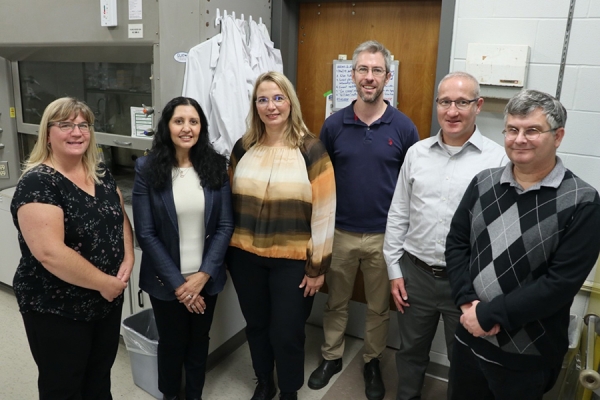 Biomedical sciences professor Brian DeVeale (fourth from left) received support for his research from the Katelyn Bedard Bone Marrow Association and representatives Joanne Bedard, Sonya Cottrell, Nicholle Kuzniak, Bryan Bedard, and Andrew Kidd.
Biomedical sciences professor Brian DeVeale (fourth from left) received support for his research from the Katelyn Bedard Bone Marrow Association and representatives Joanne Bedard, Sonya Cottrell, Nicholle Kuzniak, Bryan Bedard, and Andrew Kidd.
By developing a technique to measure how long it takes each cell type in the bloodstream to divide, Brian DeVeale hopes to reveal cancer-causing mechanisms.
An assistant professor of biomedical sciences, he will begin “Defining relative cell cycle lengths in mixed cell populations,” after receiving a one-year $25,000 WE-Spark Igniting Discovery grant funded by the Katelyn Bedard Bone Marrow Association.
“I’m extremely grateful,” says Dr. DeVeale.“We can’t do what I believe will be high-impact early stage research without this kind of support.”
The plan is to develop a technique to measure the cell cycle length of all cell types in the human bloodstream, and then use it to detect and dissect molecular stages of transformation.
“Despite division kinetics being a fundamental aspect of cell biology, the relative cell cycle lengths of distinct cell types during development and homeostasis remain largely unknown,” DeVeale says.
“We’ll look at how long it takes every cell type in the bloodstream to divide and how different mutations driving blood cancers influence cell division.”
He thinks this could be used for measuring what happens normally to better understand what goes wrong in genetically defined cancers.
“Not having that basic understanding of the normal division kinetics is problematic because we don’t have a reference from which to measure deviations such as those that occur in cancer,” he says.
The technique and focus on cell cycle regulation could also be applied to understand division of hematopoietic stem cells and their development for regenerative medicine.
“Looking long-term, if the technique is developed, this information could also be used to optimize the path for expanding donor populations for transplants.”
The Katelyn Bedard Bone Marrow Association was founded in July 2005 by Bryan and Joanne Bedard. The couple was inspired to act after losing their daughter Katelyn to leukemia at the age of 3, when she was not able to find a bone marrow donor. The association raises awareness, provides financial support, and helps fund research.
“We are pleased to hear that Brian’s work really aligns with our objectives,” says Bryan Bedard.
“We’ve raised almost a million over the years, added 10,000 people to the bone marrow registry, and we want to sponsor research.”
